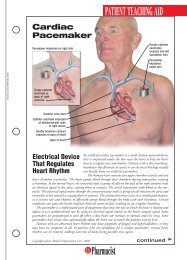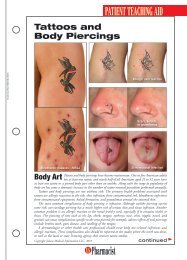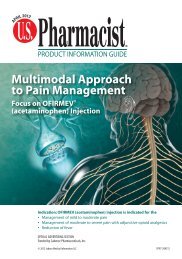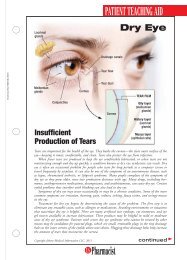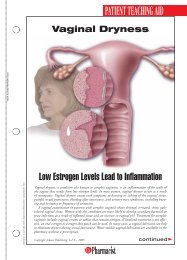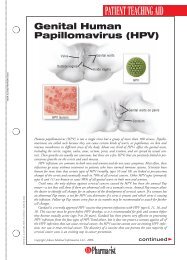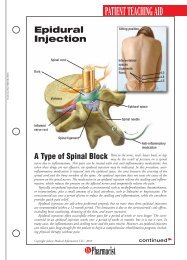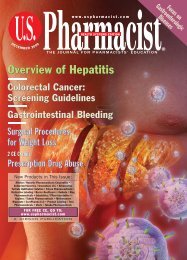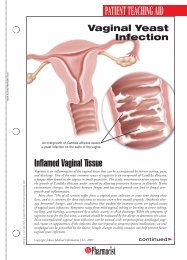View PDF Edition - U.S. Pharmacist
View PDF Edition - U.S. Pharmacist
View PDF Edition - U.S. Pharmacist
Create successful ePaper yourself
Turn your PDF publications into a flip-book with our unique Google optimized e-Paper software.
HEALTH SYSTEMS EDITIONIn-Service PrimersResearch results inthe emerging areaof nutritionalneuroscience pointto a link betweenwhat people eat andthe quality of theirmental state.Manouchehr Saljoughian, PharmD, PhD,Alta Bates Summit Medical Center,Department of Pharmacy,Berkeley, CaliforniaNutrition andClinical DepressionOVERVIEWWhile the connectionbetween nutritionaldeficiencies and physicalillness is more obvious, fewpeople see the connectionbetween nutrition and depression.This is because depression ismore typically thought of aseither biochemicaly based oremotionally rooted. It is nowproven that nutrition can play akey role in the onset, as well asseverity and duration, of depression.Nutritional neuroscience isan emerging discipline that isshedding light on the linkbetween nutritional factors andhuman cognition, behavior, andemotions. 1There are two types of depression.Behavioral depression or“the blues” results from variouscauses, and most people experienceit at some point in theirlives. Clinical depression, on theother hand, is much more serious.It is usually caused by achemical imbalance in the brainand requires medical attention. 2Nutrition plays an importantrole in every aspect of well-being,and improper nutrition can leadto poor bodily function. Thereare many reports that people withclinical depression also sufferfrom malnutrition. The dietaryhabits of the general populationin the United States and manyAsian countries reveal that peopleare often deficient in many nutrients,especially essential aminoacids, vitamins, minerals, andomega-3 fatty acids. People whoare depressed often lose all senseof self and stop eating and caring.Food alone cannot preventdepression, but poor nutritionmakes the body incapable ofhealing itself. Supplements containingamino acids have beenfound to reduce symptoms ofdepression, as they are convertedto neurotransmitters, which inturn alleviate depression andother mental health problems. 3Since most antidepressant prescriptiondrugs have side effects,it is possible that some patientswho are not being observed bypsychiatrists will skip taking theirmedications. Such noncompliancecan put patients at a higherrisk for committing suicide orbeing hospitalized. An alternateand effective way for psychiatriststo circumvent noncompliance isto familiarize themselves withalternative or complementarynutritional therapies. Psychiatristscan recommend doses of dietarysupplements based on efficaciousstudies and adjust the doses basedon the results obtained by closelyobserving the changes in thepatient. 4If a person with depressionsuffers from loss of sleep, clinicianswill either increase theamount of amino acids in theirdiet or add iron for loss ofappetite. There are foods thatshould be included in the diet ofa person with clinical depression.Meat and amino acids such asphenylalanine, tryptophan,choline, and tyrosine—whichhelp the nervous system functionproperly—should be added to theHS-28U.S. <strong>Pharmacist</strong> • November 2009 • www.uspharmacist.com



